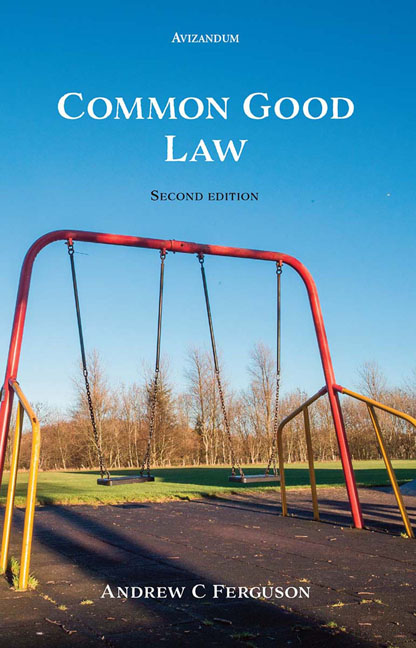Book contents
- Frontmatter
- Contents
- Preface
- Tables of Legislation
- Table of Cases
- 1 Origins and Definitions
- 2 Statutory Framework
- 3 The Administration of the Common Good
- 4 Inalienable Common Good Property
- 5 Classification of Common Good Land
- 6 Appropriation, Alienation and Disposal of Common Good Land
- 7 When Does ‘a Question’ Arise?
- 8 Factors Involved in Allowing Disposal
- 9 Taking a Common Good Case to Court
- 10 Common Good and Community Empowerment
- Appendix I List of Burghs
- Appendix II Disposal, Appropriation and Alienation
- Index
10 - Common Good and Community Empowerment
Published online by Cambridge University Press: 20 October 2020
- Frontmatter
- Contents
- Preface
- Tables of Legislation
- Table of Cases
- 1 Origins and Definitions
- 2 Statutory Framework
- 3 The Administration of the Common Good
- 4 Inalienable Common Good Property
- 5 Classification of Common Good Land
- 6 Appropriation, Alienation and Disposal of Common Good Land
- 7 When Does ‘a Question’ Arise?
- 8 Factors Involved in Allowing Disposal
- 9 Taking a Common Good Case to Court
- 10 Common Good and Community Empowerment
- Appendix I List of Burghs
- Appendix II Disposal, Appropriation and Alienation
- Index
Summary
Background to the 2015 Act
In some senses the concept of community empowerment is nothing new. There has always been a tension in local government as to how ‘local’ decision-making can be: the 1973 Act, for example, recognised that the creation of large regional councils such as Strathclyde - and even the bigger urban or rural district councils - left local people, particularly those in former burghs who had been used to decision-making taking place at burgh level, feeling disenfranchised to a greater or lesser extent. In that context, community councils themselves could be seen as an early example of community empowerment.
The rise, and increasing professionalisation, of the third sector in the early years of this century provided another outlet for those who felt local government was too distant from their concerns with an opportunity to create community bodies that would address those concerns on a more localised basis.
Similarly, the Land Reform (Scotland) Act 2003, discussed at 2.3, introduced the concept of a community right to buy, at that stage in rural areas and small settlements. This, again, was an expression of the same desire to allow localities - including former burghs - the chance for greater control of their own destiny.
The Policy Memorandum behind what became the Community Empowerment (Scotland) Act 2015 stressed that the Scottish Government believed that Scotland's people were its greatest asset; and that, accordingly, the Government was committed to supporting subsidiarity and local decision-making. Bringing together the fruits of discussions with various bodies, including COSLA, and the Christie Commission's findings, the Bill, and then the Act, sought to advance the empowerment of communities in various ways.
Whilst some of the Parts of the Act, such as National Outcomes and Community Planning, will no doubt link to matters related to common good land and buildings in one sense, it is intended here only to touch on those specific powers in the Act which are most likely to have more direct relevance in matters relating to common good, before dealing with the provisions relating directly to it.
- Type
- Chapter
- Information
- Common Good Law , pp. 141 - 148Publisher: Edinburgh University PressPrint publication year: 2020



